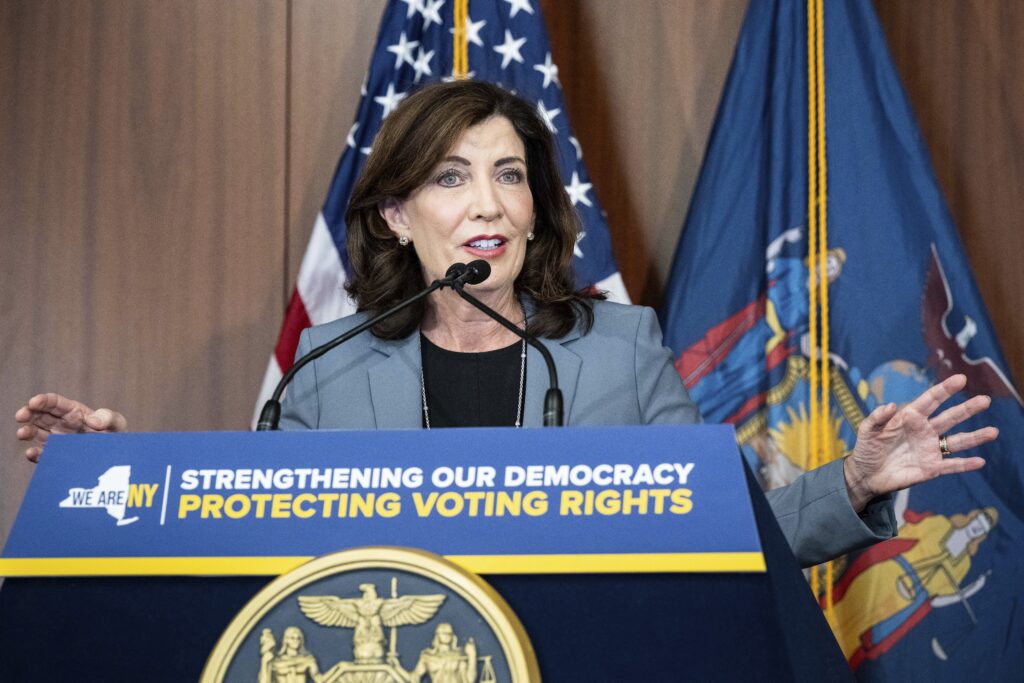New York Governor Signs Several Voting Rights Laws Ahead of 2024 Election

New York Gov. Kathy Hochul (D) signed seven bills into law last week that expand ballot access on the anniversary of the signing of the Voting Rights Act.
“Our democracy is rooted in the sacrifices of those willing to fight for that idea greater than any one of us, and with this legislation, we are strengthening our efforts to protect it,” Hochul said in a statement. “Every New Yorker deserves the opportunity to have their voice heard, and these laws bring the ideals of self-governance closer to reality.”
Senate Bill S5943 requires ballots to list the offices in order of precedence —
- Electors for president and vice president
- Governor and lieutenant governor
- State comptroller
- State attorney general
- U.S. Senator
- U.S. House member
- State senator
- Member of the state assembly.
All other offices will be listed on the ballot afterward in a customary order, with partisan offices preceding nonpartisan offices. State Sen. James Skoufis (D), who authored the bill, said this change is necessary because races listed at the end of the ballot do not receive as much voter participation as those at the beginning of a ballot. Also, this will make the ballot more straightforward for voters, he said.
“Voters will know what to expect to find on their ballot so they can cast their vote confidently,” Skoufis said. “This confidence allows citizens to more fully and enthusiastically engage in our democratic process, which should be the goal of every elected official.”
Senate Bill S6130A — the Election Integrity and Oversight Act — will allow New York voters who are lawyers to be poll watchers at any polling location in the state. Previously, someone could only serve in this role at a polling station in the city or county they are registered to vote in.
State Sen. Kevin Parker (D), the bill’s author, said this legislation “ensures greater transparency and integrity in our elections.”
Senate Bill S6735A allows pre-registered voters who will be 18 years old by Election Day to apply for an absentee or early mail voting ballot.
“It’s an important step forward in expanding voting rights for New Yorkers, and it will make it easier for everyone to participate in the democratic process,” said state Sen. Rachel May (D), the author of the bill.
Senate Bill S8464 will ensure New York complies with the requirements set under the federal Electoral Count Reform Act.
“The Electoral Count Reform Act is essential legislation needed to protect the integrity of our elections,” Assemblymember Monica Wallace (D) said. “As we commemorate the anniversary of the Voting Rights Act, we must commit to preserving both the right to vote and the peaceful transfer of power.”
Senate Bill S9687 amends the John R. Lewis Voting Rights Act (VRA) of New York to expand who is protected under the law and requires certain local governments to receive preclearance for legislation that could potentially violate this law.
Hochul signed the state’s VRA in June 2022, which protects people against voter dilution, intimidation and suppression, according to a statement.
Senate Bill S9763 will “correct an inconsistency between village and election law to ensure villages in New York State have proper time to put referendums on their November ballots,” the bill’s author, State Sen. Shelley Mayer (D), said.
Senate Bill S9837 makes it easier for voters to cure ballots by requiring election boards to provide voters with a paid postage envelope to return their cured ballots and giving voters the option to return these ballots via email.
Also, prior to the new law, cured ballots had to be received by the election board within seven business days of the board mailing a notice that the ballot was rejected or the day before the election — whichever is later. Now, cured ballots have to be received within seven business days of the board’s mailing of the rejection notice or by 5 p.m. on the seventh day after the election — whichever is later.
All of these bills will be in effect for the consequential 2024 election, except for the bill regarding the order of candidates on the ballot, which will take effect on Jan. 1, 2025.
Over the past year, Republicans have challenged numerous of New York’s pro-voting laws, including ones establishing no-excuse mail-in voting, allowing for the review of absentee ballots on a rolling basis and moving certain local elections from odd to even years.
Read a statement from Hochul and state legislators on the laws here.